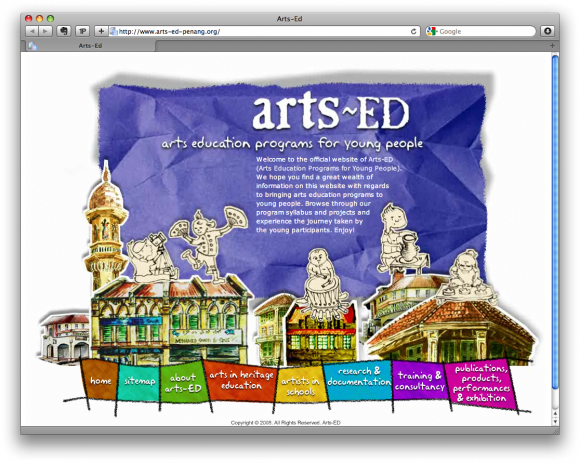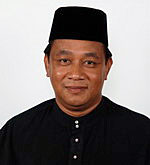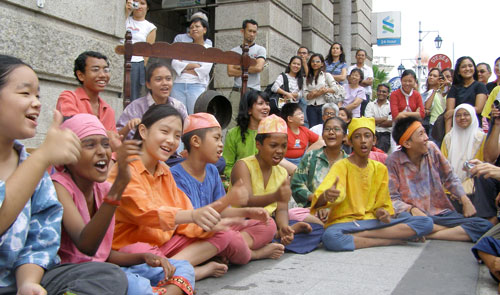
THE idea that all us are out to “hina Melayu” is so last decade. By blaming Arts-Ed for bringing out “isu perkauman”, the Gabungan Bela Hak Insan has stooped really low in order to spread its own political ideologies.
According to the Gabungan, they were “merely pointing out errors” in the My Balik Pulau newsletter which Arts-Ed publishes. The last time I checked, pointing out errors does not involve burning 15 copies of our children’s hard work and screaming “Allahuakhbar” while doing so. Stop making everything racial and religious. We are just tired of this pattern of using race and religion to gain political support.
Let’s be clear: Arts-Ed is non-political. It is an organisation that educates youths about our community’s heritage. This is done by getting children to conduct interviews and collect oral histories from the communities they reside in. We have no intention to alter history whatsoever. Instead, our aim is to share history and stories that are unique to each person in the community. It is basically residents sharing their life stories with each other.

How then can one say my personal family and life history is erroneous? It is my ancestors, my family, my life. I am appalled at the claim by Pulau Betong assemblyperson Muhammad Farid Saad in Utusan Malaysia that Arts-Ed is a deliberate attempt to deny the rights of fellow Malays.
Art-Ed is a remarkable effort to educate youths about our history, and gives us a sense of identity. Something that formal history education and our school culture failed to do for years, Art-Ed achieves in a span of a few months. I have been working with Arts-Ed since 2003. At the age of 13, Arts-Ed gave me a reason to be proud of my culture, my state and my country. I knew nothing about history. All I learned from schools was how to memorise history, not understand my history. The government thinks that by singing a few national songs and murmuring some ikrar on a weekly basis, students will be more patriotic. Boy, do they have it wrong!
There is only so much textbooks and classrooms can teach us. Arts-Ed takes a different approach to learning history. It uses arts as a tool to educate youths about heritage. We learn so much about our people and ourselves. We learn skills schools never taught us. We learn maturity, independence, and most importantly, we learn unity. We realise how all of us are unique but fundamentally the same. We learn the community’s songs, music, and traditional trades. We try our very best to keep our heritage alive. Through Arts-Ed, we experience history rather than just read history. By burning copies of our work, I wonder what exactly Gabungan Bela Hak Insan were planning to achieve?

Instead of bashing Arts-Ed’s efforts, they should be applauding Arts-Ed for its efforts in realising 1Malaysia. Go for an Arts-Ed meeting, see how the children interact with each other. See how they do not even notice the colour of each other’s skin. See the love, support and patriotism they have for each other and for our beloved Penang. See how proud they are of their identity. Learn from them! Arts-Ed children have grasped the idea of 1Malaysia long before our government even thought of implementing it.
Natasha Khanum
Arts-Ed participant
13 Feb 2011


Perompak Cinta says
“This is done by getting children to conduct interviews and collect oral histories from the communities they reside in. We have no intention to alter history whatsoever.”
Children are free to write whatever they want. It’s their personal views. But then again, when something is out of line, or wrong, as an adult, doesn’t that make you responsible to correct the mistakes?
We’re [living] in quite an intense time now, with politicians using racial tension as part of their strategy. As a responsible adult, the least you can do is not to make matter worse.
Even without political influence, My Balik Pulau discussed things that agitated the Malays. So, to blame the ‘Gabungan Bela Hak Insan’ that wanted facts in My Balik Pulau to be corrected is somehow childish.
Nazlina says
Perompak Cinta,
Who are you to say that in this case, the children are wrong? Who are you to say that Gabungan has the rights to do what they did?
We are tired of people like you who judge and make comments without trying to understand.
I taught children of Arts-Ed to make satay last year. Children of all races worked together and ate together. We had fun and we learnt a lot. I doubt you have ever had this kind of experience.
Jacqueline Ann Surin says
That’s quite a few assumptions you’re making.
Assumption #1: That the children got their facts wrong.
Really? These are residents’ personal histories and memories of belonging that the children documented. How did Gabungan Bela Hak Insan become an expert on OTHER people’s personal histories?
Assumption #2 That the project “agitated the Malays”
All Malays? Or just a particular group? And if all Malays are not agitated, what exactly is making those in the Gabungan so agitated? What exactly in the documented oral histories of fellow Malaysians is causing this “insult to Malays”. Claims are oh-so-easy to make. How about backing them up with proof or sound argument?
Assumption #3 That it’s ok to use threatening means (burning the books) and the veneer of God being on their side (shouting Allahuakhbar) to correct childrens’ “mistakes”.
Goodness! Do we need to threaten children in order to correct their mistakes? Overkill, innit? If it really was about “educating” the children, I think the Gabungan could have found other ways to engage the children. Instead, they chose to posture and threaten — hmm, one wonders, whose benefit was all that public venting and posturing for?
Assumption #4 That adults always know better than children.
Really? All the time? All adults? And by extension, are you saying that the adults have nothing to learn from the children? And, oh, by the way, who corrects the mistakes of adults?
U-Jean says
Awesome response!
Kate Green, Zombie Shooter says
So, to blame the ‘Gabungan Bela Hak Insan’ that wanted facts in My Balik Pulau to be corrected is somehow childish.
I honestly think this ‘Gabungan’ group acted more childishly than the children involved.
Anne Jame says
Shame on you Mohd Farid Saad! Let the CHILDREN teach you the REAL meaning of unity and being HUMAN. You have failed to foster understanding, you have trampled on the work of good people and children and you have forgotten what it means to be truly human. Learn from the children in your own constituency; I believe you live in Balik Pulau. Attend an ArtsEd programme and who knows, the children might be able to teach you more than a thing or two.
Lainie Yeoh says
I remember attending a few Arts-Ed events and finding them such a fun, positive and harmonious collaboration by the children.
Makes me sad to know people are trying to pollute an environment like Arts-Ed with their hate politics.
Peter says
Excellent reply on a, sorry to say, stupid reply on your great work. I have seen the paper and I was impressed by both quality of info and the way it was printed and formatted. This initiative should be SUPPORTED nationwide instead of been burned down. Even if this was the not the work of children (which makes this work even more impressive). Keep the good work up!!!
Ramlah says
The question is, is it right to teach students that historical revisionism is fine, especially if it is conducted in such a laissez-faire way?
Obviously, some of the ones they interviewed had vested interests in telling ‘stories’, or if you would have it ‘histories’ that solely valorised the Chinese [Malaysian] contributions to Balik Pulau. Were the students taught how to corroborate these accounts, or were they just left to accept them at face value?
I hope that the children who managed to see their works burnt learn a lesson about doing their homework properly in the future and not to rely on testimonies by those with sinister and insidious intents. May they grow up with criticality and skepticism, and not allow themselves to be manipulated by forces which aim to marginalise Malay [Malaysian] presence and contributions in Balik Pulau.
Nazlina says
I do not agree, Ramlah. The interviewees had no vested interest. It was told as it was, from their points of view.
“forces which aim to marginalise Malay [Malaysian] presence and contributions in Balik Pulau.” ???? What FORCES? I do not see there are any forces involved […]
The thing is, people like you refuse to listen to their side of story, no matter how it is explained.
Jacqueline Ann Surin says
@Ramlah, I hope you realise that the project — what you call “historical revisionism” — started out under the previous BN state government, and was partly funded by the Penang Tourism Action Council and DiGi during the tenure of the previous government.
You can read all about it here if you’d like to understand this issue better: http://www.klik4malaysia.com/index.php?option=com_content&view=article&id=10802%3Amy-balikpulau&catid=137%3Ai-want-to-say&lang=en
If your claim is accurate (although there is no evidence from your comment that it can be backed), then it is the BN which supported this “valorisation” of the Chinese Malaysians and the “marginalisation” of Malay Malaysians.
Hmm, then perhaps we can thank the BN for being “sinister and insidious”?
Ramlah says
Of course when the BN government supported the project it was based on an innocent-sounding proposal, involving youths supposedly ‘exploring their heritage’. Little did they know that it was going to be hijacked by pernicious parties that sought to underplay Malay existence in Balik Pulau.
When reading the booklet, one notes how much attention is paid to the non-Malay [Malaysian] elements of Balik Pulau — be this in the discussion of Chinese [Malaysian] shophouse architecture, or the extensive spread of photographs given to the Christian orphanage, the Chinese temple, the Chinese school etc (as compared to the lone mosque). There are also insulting illustrations — like that of the korban kerbau, depicted as if the animal to be slaughtered was a figure of fun (with its tongue lolling). Furthermore, another illustration recycles tired stereotypes: a Malay [Malaysian], looking almost like a beggar with a patched-up baju, asks a chettiar if he [can] borrow money for his child’s wedding; on the other hand, a prosperous and confident-looking Chinese [Malaysian] asks for a loan to start a business.
One is not asking for a recognition of primus inter pares here; one is asking that Malay [Malaysian] representation in the booklet is fair and unbiased. Unfortunately this was not the case. Whether this was due to the children themselves being quite disingenuous, or whether they were somehow steered towards certain directions, one does not know. But what is clear is that the people at Arts-Ed must not be allowed to continue brainwashing our future generations and undo the good work that the Biro Tata Negara is doing.
Jacqueline Ann Surin says
The “good work” that BN is doing? You mean the racism that is rife in BTN is “good work”. I would suggest you read our series of interviews and commentaries on the kind of work BTN does here: https://www.thenutgraph.com/?s=BTN&x=0&y=0&=Go Unless of course you already know the kind of work BTN does and still believe it’s “good work”.
The difference between Arts-Ed and BTN is that Arts-Ed tries to BUILD community by getting the younger generation to understand their community’s history and heritage. It does not aim to promote ALL histories of a community. BTN, however, tries to DIVIDE communities by falsifying our history and promoting a particular political agenda. How BTN’s work can be considered “good” and Arts-Ed’s “pernicious”, I fail to see.
Ramlah says
Jacqueline: I am heartened to know that you agree with me that Arts-Ed is as bad as BTN. At least we are on the same page on this.
However, I’d like you to consider one thing: by disguising the mybalikpulau project as one conducted by supposedly blameless kids, Arts-Ed is actually being obscurantist about their real agenda. At least with BTN it is very clear: it is transparently an indoctrination project aimed at giving primacy to neglected issues such as ketuanan Melayu, and to remind non-Malays of their sojourner fairweather-opportunistic origins.
You have not addressed at all the lopsidedness of the mybalikpulau project — at most you resort to a hand-wringing defence of ‘we can’t possibly cover everything’. Of course; but the omissions are telling.
I would like to share a patriotic song that we learn in BTN, called ‘Warisan’, which I think highly relevant to this discussion:
Anak Kecil main api
Terbakar hatinya yang sepi
Air mata darah bercampur keringat
Bumi dipijak milik orang
Nenek moyang kaya raya
Tergadai seluruh harta benda
Akibat engketa sesamalah kita
Cinta lenyap di arus zaman ini
Indahnya bumi kita ini
Warisan berkurun lamanya
Hasil mengalir ke tangan yang lain
Pribumi merintih sendiri
Melayukan gagah di nusantara.
Ramlah says
I’m not understanding this editorial policy of appending [Malaysian] to race designations. This has resulted in a phrase like ‘Malay Malaysian’ looking extremely tautological.
To refine this protocol:
Keep ‘Chinese Malaysian’.
Keep ‘Indian Malaysian’.
Modify ‘Malay Malaysian’ to ‘Malay-sian’.
This is because the word ‘Malaysia’ itself comes from the word ‘Malay’. As the esteemed Tun Dr Mahathir has mentioned in his recent erudite posting, the original name for the Federation of Malaya was ‘Persekutuan Tanah Melayu’. Trust the British to translate it in such a slipshod manner!